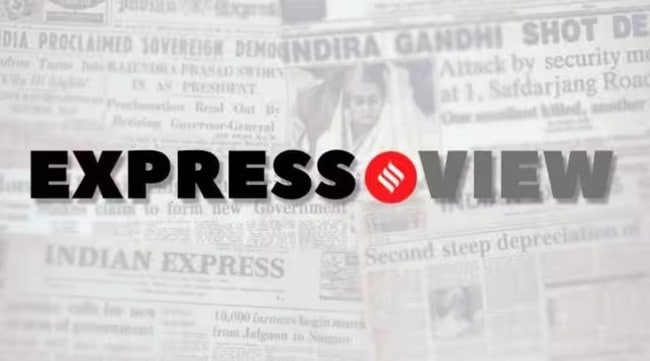Opinion Express View on SC’s direction to educate police on freedom of speech: Let the people speak
This is a reminder that dissent within legitimate bounds is the cornerstone of a vibrant democracy
 The bench was hearing a case against a professor in Kolhapur booked for his WhatsApp status criticising the abrogation of Article 370 and for wishing Pakistan on its independence day.
The bench was hearing a case against a professor in Kolhapur booked for his WhatsApp status criticising the abrogation of Article 370 and for wishing Pakistan on its independence day. That the right to dissent is the first principle of a vibrant democracy is a truth frequently undermined in recent years. But the Supreme Court’s (SC) reminder that every criticism of the state, especially when within legitimate bounds, does not amount to offence, reinforces constitutional values at a time when debate and dissent are routinely stifled, citing hurt sentiments, national security or impediments to communal harmony.
The Court’s direction to “enlighten and educate our police machinery on the concept of freedom of speech and expression guaranteed by Article 19 (1) (a) of the Constitution” underscores another crucial point: The enforcement agency’s conflation of lawful exercise of dissent with incitement cannot infringe on individual liberty.
The bench was hearing a case against a professor in Kolhapur booked for his WhatsApp status criticising the abrogation of Article 370 and for wishing Pakistan on its independence day.
The apex court’s observation is of a piece with its earlier deliberations on the limits of free speech. Last year, in Kaushal Kishore v State Of Uttar Pradesh, while advising public officials to exercise restraint in their speech, a five-judge Constitution Bench had held that freedom of speech cannot be curtailed for any reason except those specified under Article 19(2) of the Constitution.
In a separate judgment in the same case, Justice BV Nagarathna had held, “It is only when there is dissent that different ideas would emerge which may… assist the government to improve or innovate upon its policies…” In the present judgment, quashing the charges against the professor, the Court observed that the “test to be applied” is “not the effect of the words on some individuals with weak minds or those who see a danger in every hostile point of view. The test is of the general impact of the utterances on reasonable people who are significant in numbers.”
While the SC’s observation pertains to the police in particular, the need for sensitisation is felt across stakeholders, including in lower courts and among civil society.
The bogey of hurt sentiments seems to hold sway everywhere, from cricket stadiums over support for rival teams, amid protests against screening of particular films in colleges or universities, to complaints against azan over loudspeakers. They threaten to shrink the formal inclusivity and equality of diverse viewpoints enshrined in the Constitution to a majoritarian understanding of freedom of expression. While exposure to landmark judgments and discussions with legal experts will certainly aid the police, a resurrection of the argumentative Indian — with faith in rational debate and in both sides being heard — will also help.




